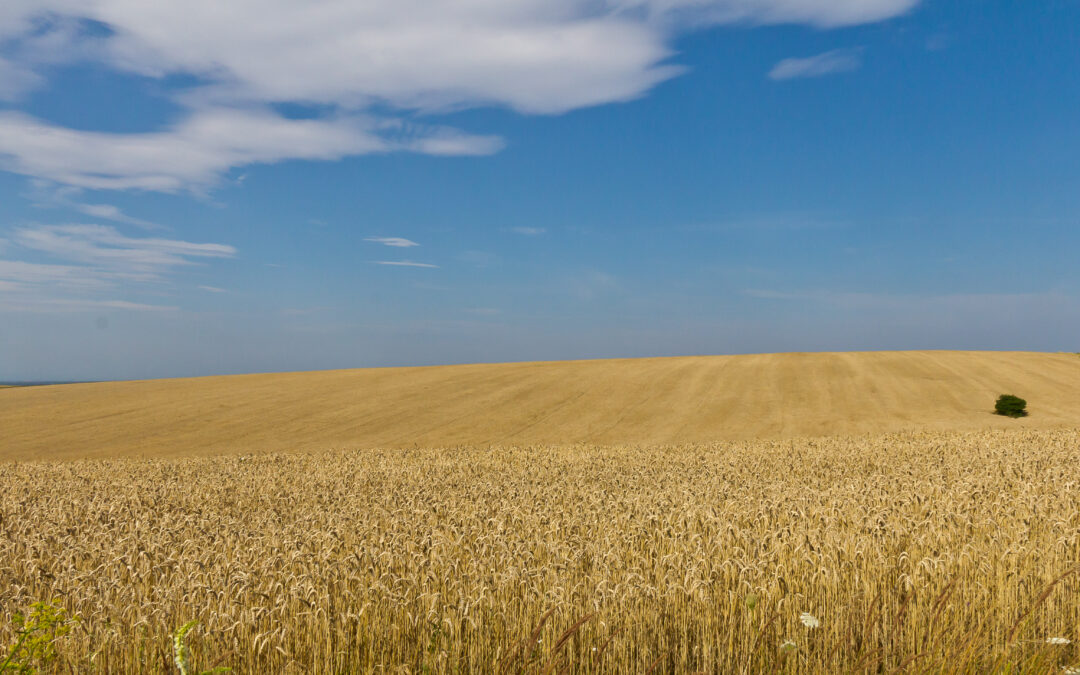Poland will take steps to limit the entry of grain from Ukraine onto its market and will seek similar action from the European Union, Prime Minister Mateusz Morawiecki has announced. The issue has caused protests by Polish farmers, who say that the inflow of Ukrainian produce is lowering prices.
After Russia’s invasion last year, Ukraine – which is one of the world’s biggest grain exporters – found its normal transport routes through the Black Sea blocked. That led to an increase in exports through Poland and other neighbouring countries by road and rail.
The Polish government, which has been one of Kyiv’s closest allies, supported the transport of grain through its territory. It assured Polish farmers that the produce was intended for export elsewhere and would not enter the local market, thereby lowering prices.
Over 450,000 tonnes of grain from Ukraine is being transported through Poland monthly.
That is 16 times more than a year ago and 50% more than in mid-2022, as Poland seeks to help Ukraine overcome difficulties caused by Russia's invasion https://t.co/2BofAyo0Bf
— Notes from Poland 🇵🇱 (@notesfrompoland) December 2, 2022
Some farmers, however, say that this is exactly what has happened. “[Agriculture] Minister Henryk Kowalczyk betrayed and tricked Polish farmers,” Michał Kołodziejczak, leader of Agrounia, a protest movement, told the Rzeczpospolita daily this week.
“He had information that much too much grain comes from Ukraine, that it does not leave the country, that it floods our market, [but] he did absolutely nothing,” claimed Kołodziejczak. “[The government] must exclude Ukrainian grain from trade in Poland as much as possible.”
Yesterday, talks began between farmers’ representatives, including Kołodziejczak, and the agriculture ministry. Meanwhile, even before those talks concluded, Morawiecki announced that the government would be taking steps.
Obrady #okrągłegostołu w sprawie ukraińskiego zboża zakończone! Niewiele wiadomo o konkretnych ustaleniach. Pewne jest, że już na wejściu było gorąco. Minister @Kowalczyk_H miał swoje powody, by podczas spotkania nie było ani mediów, ani telefonów. ⬇️https://t.co/RsaM2Pz10w
— farmer.pl (@farmer_pl) March 29, 2023
“This grain is destabilising our market, we are aware of this” he admitted. “That is why…I have instructed Minister Kowalczyk to develop appropriate rules, very quickly.”
These will “allow us to remove part of the grain that has accumulated [in Poland] – that is, to sell it in North Africa and the Middle East, where it was supposed to go”, said Morawiecki. There will also be new “regulations and provisions that will limit the impact of Ukrainian grain on Poland”.
The prime minister said that, while Poland wants to help Ukraine, “in this case we have a serious problem, our farmers, Polish agriculture, and [that is what] I am interested in”. He noted that at a recent EU summit leaders had agreed to ask the European Commission for “immediate action” on the issue.
Premier @MorawieckiM w #KPRM: Podczas RE, uzgodniłem z premierami państw UE, które graniczą z 🇺🇦, że przekażemy list do @vonderleyen z żądaniem natychmiastowego działania, aby ograniczyć zboża 🇺🇦 na rynki krajów sąsiadujących. Destabilizuje to rynki lokalne. Jesteśmy w stanie…
— Kancelaria Premiera (@PremierRP) March 29, 2023
Morawiecki’s remarks followed a meeting on Tuesday with Prime Minister Nicolae Ciucă of Romania, another country that borders Ukraine, at which the two leaders appealed to the European Union to introduce a system for better tracing Ukrainian grain transports to ensure they do not enter local markets.
Earlier this month, Romania’s agriculture minister, Petre Daea, said that the European Commission estimates farmers in Poland, Romania, Hungary, Bulgaria and Slovakia have lost €417 million due to the inflows of cheaper Ukrainian grains onto their markets, reports Euractiv.
Earlier this month, the European Commission announced support measure worth €56.3 million for Bulgarian, Polish and Romanian farmers in response to “concerns about effects of the increased imports of Ukrainian cereals and oilseeds on local markets”.
Polish, Romanian PMs ask EU for mechanism to trace Ukraine grain exports https://t.co/UADg1Vjhv1 https://t.co/xVzj0TTyFZ
— EURACTIV (@EURACTIV) March 29, 2023
However, in an interview with news website wPolityce yesterday, Kowalczyk argued that Ukrainian grain is “not the main reason” for falling prices. There is “a decline in global markets,” he added.
Following yesterday’s talks at the agriculture ministry, Kołodziejczak said that the government had not provided any specific information about the measures it intends to take. The government has also faced criticism over the issue from opposition parties.
“We submitted a bill on the protection of Polish agriculture, where we put down a simple solution for introducing a deposit for the import of grain from Ukraine,” Dariusz Klimczak, deputy leader of the agrarian Polish People’s Party (PSL), told Polsat News.
“Why didn’t PiS [the ruling Law and Justice party] make use of it?” he asked. “Farmers are going bankrupt because of these mistakes.”
💬 Zgłosiliśmy ustawę o ochronie polskiego rolnictwa, gdzie zapisaliśmy proste rozwiązanie dotyczące wprowadzenia kaucji na wwóz zboża z Ukrainy. Dlaczego @pisorgpl z niego nie skorzystał? Przez te błędy bankrutują rolnicy.
🍀@DariuszKlimczak
📺@PolsatNewsPL pic.twitter.com/exPlrwy8o0— 🍀 PSL (@nowePSL) March 29, 2023

Daniel Tilles is editor-in-chief of Notes from Poland. He has written on Polish affairs for a wide range of publications, including Foreign Policy, POLITICO Europe, EUobserver and Dziennik Gazeta Prawna.




















